人教新目标版七年级下Unit 2 What time do you go to school-Section B (3a~Self Check)课件(21张))
文档属性
| 名称 | 人教新目标版七年级下Unit 2 What time do you go to school-Section B (3a~Self Check)课件(21张)) |  | |
| 格式 | pptx | ||
| 文件大小 | 202.1KB | ||
| 资源类型 | 教案 | ||
| 版本资源 | 人教新目标(Go for it)版 | ||
| 科目 | 英语 | ||
| 更新时间 | 2022-04-27 13:04:18 | ||
图片预览

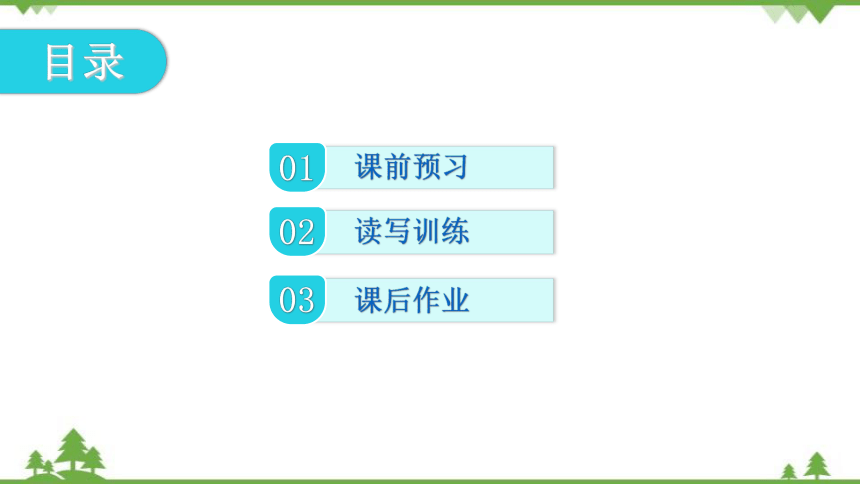
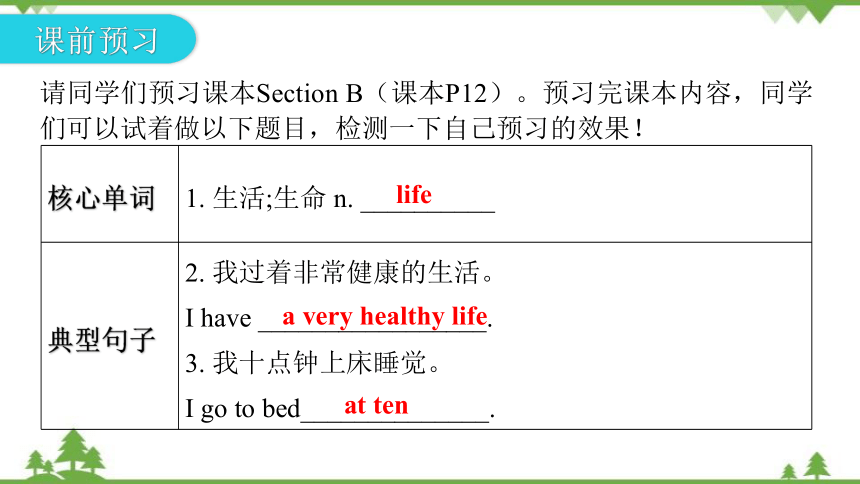
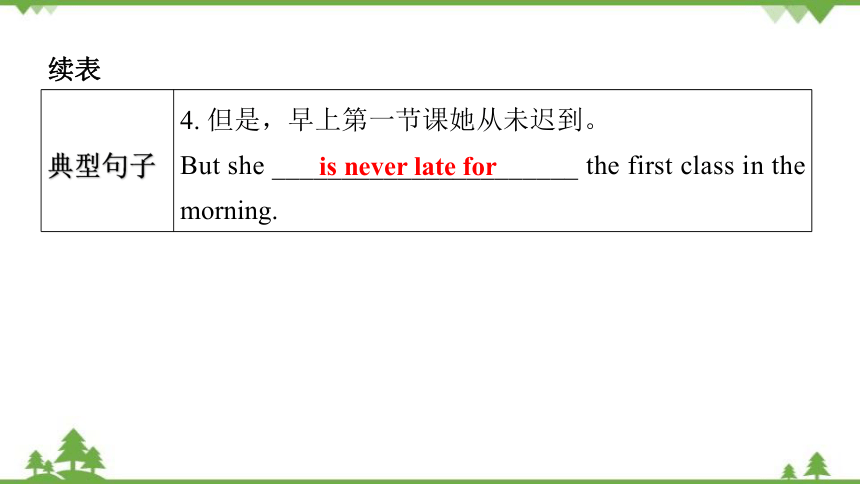
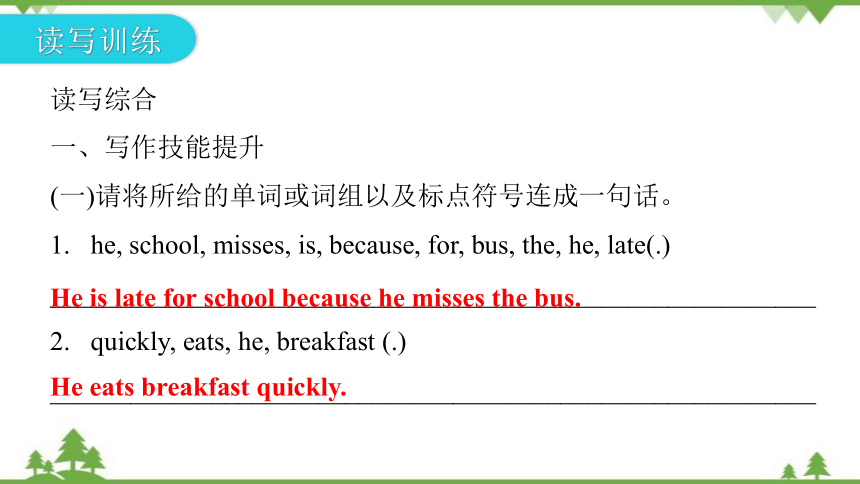


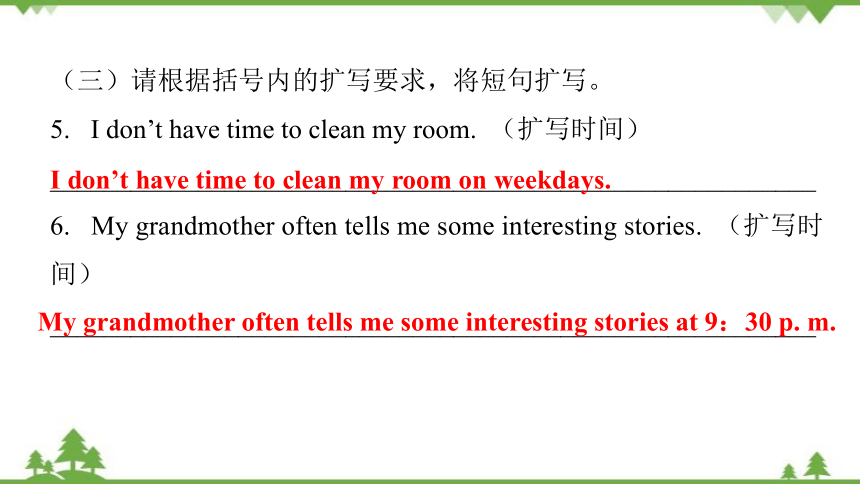
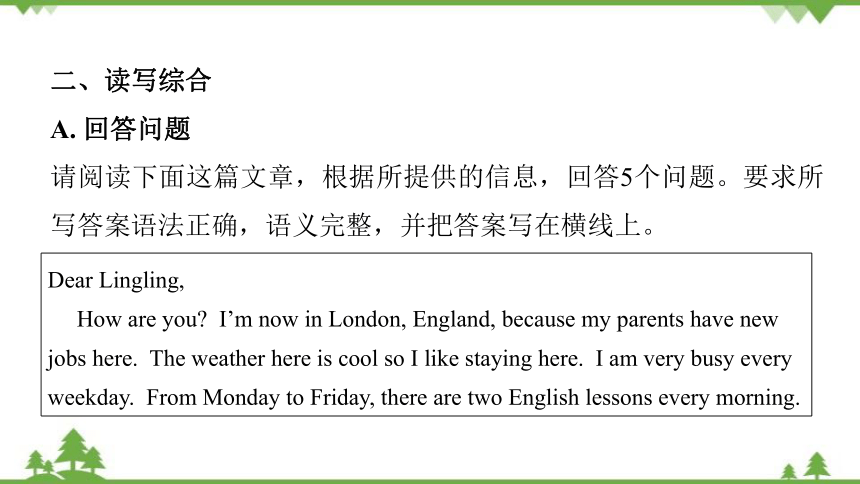
文档简介
(共21张PPT)
Unit 2 What time do you go to school?
第四课时 Section B (3a~Self Check)
目录
01
课前预习
02
读写训练
03
课后作业
课前预习
核心单词 1. 生活;生命 n. __________
典型句子 2. 我过着非常健康的生活。
I have _________________.
3. 我十点钟上床睡觉。
I go to bed______________.
请同学们预习课本Section B(课本P12)。预习完课本内容,同学们可以试着做以下题目,检测一下自己预习的效果!
life
a very healthy life
at ten
续表
典型句子 4. 但是,早上第一节课她从未迟到。
But she ______________________ the first class in the morning.
is never late for
读写训练
读写综合
一、写作技能提升
(一)请将所给的单词或词组以及标点符号连成一句话。
1. he, school, misses, is, because, for, bus, the, he, late(.)
_________________________________________________________
2. quickly, eats, he, breakfast (.)
_________________________________________________________
He is late for school because he misses the bus.
He eats breakfast quickly.
(二)请使用所给的短语及参照相关例句,仿写句子。
3. do one’s homework 做作业
【例句】She usually does her homework at 8 o’clock in the evening.
【拓展】homework 是不可数名词,用 much或lots / a lot of来修饰,如:too much homework 太多家庭作业
【仿写】你通常几点做你的家庭作业?
_________________________________________________________
What time do you usually do your homework
4. lots of 大量,许多
【例句】There are lots of trees in my hometown.
【拓展】lots of = a lot of,均可以修饰不可数名词和可数名词复数
【仿写】许多学生午餐不喜欢吃很多蔬菜。
_________________________________________________________
Many students don’t like to eat lots of vegetables for lunch.
(三)请根据括号内的扩写要求,将短句扩写。
5. I don’t have time to clean my room. (扩写时间)
_________________________________________________________
6. My grandmother often tells me some interesting stories. (扩写时间)
_________________________________________________________
I don’t have time to clean my room on weekdays.
My grandmother often tells me some interesting stories at 9:30 p. m.
二、读写综合
A. 回答问题
请阅读下面这篇文章,根据所提供的信息,回答5个问题。要求所写答案语法正确,语义完整,并把答案写在横线上。
Dear Lingling,
How are you I’m now in London, England, because my parents have new jobs here. The weather here is cool so I like staying here. I am very busy every weekday. From Monday to Friday, there are two English lessons every morning.
续表
They are for reading and writing. I get up at 7:00 a. m. After breakfast, I have a reading lesson at 8:30 a. m and a writing lesson at 9:20 a. m. English is my favorite subject. I also learn math and French. I have lunch at 12:10 p. m. I have bread, fish, beef and vegetables. They are all my favorite. In the afternoon, I have P. E. , art or music. I have dinner at 6:00 p. m. In the evening, I read some books. I like reading very much. I go to bed at 9:30 p. m.
What about your school life Do you like it Please tell me about it.
Yours,
Susan
1. Where is Susan now
_________________________________________________________
2. What’s the weather like there
_________________________________________________________
3. How many English lessons does Susan have every week
_________________________________________________________
She is in London, England now. / In London, England.
It is cool there. / Cool.
She has ten English lessons every week. / Ten.
4. What does Susan have for lunch
_________________________________________________________
_________________________________________________________
5. When does Susan go to bed
_________________________________________________________
She has bread, fish, beef and vegetables for lunch. / Bread, fish, beef and vegetables.
She goes to bed at 9:30 every night. / At 9:30 p. m.
B. 书面表达
假设你是玲玲,请你用英语给Susan回信,向她介绍自己的日常生活。
内容包括:
(1)收到来信的心情;
(2)你每天的一些日常生活习惯,包括好的习惯和不好的习惯;
(3)不好的习惯你打算怎么改正?
作文要求:
(1)不能照抄原文;不得在作文中出现学校的真实名称和学生的真实姓名。
(2)语句连贯,词数60个左右。作文的开头已经给出,不计入总词数。
【巧列提纲】(点拨 部分仅供参考,希望同学们多开动脑筋、发散思维)
【实战演练】
Dear Susan,
_______________________________________________________________________________________________________________________________________________________________________________________________________________________________________________________________________________________________________________________________________________________________________________________________________________
Yours,
Lingling
It’s happy to hear from you.
I usually get up at 6:30 in the morning and then have breakfast. My first class begins at 8:00. I usually have lunch at school. After lunch, I always eat ice-cream. My classes finish at 5:00 p.m. After dinner, I do my homework. I go to bed at 9:30.
I know it is a bad habit to eat lots of ice-cream. I think I can’t eat it too much because they are unhealthy.
【语言点拨】(以下短语仅供参考,旨在帮助同学们升级文章的语言表达)
1. 表达收到来信很开心
hear from you 收到你的来信
tell sb. about sth. 告诉某人关于某事
my school life 我的学校生活
2. 日常生活习惯
get up 起床 play tennis 打网球
good habits 好习惯 bad habits 坏习惯
take a shower 淋浴 watch TV 看电视
have English classes 上英语课 read some books 看书
do my homework 做家庭作业 go to bed 上床睡觉
leave home to school 出门去上学 listen to music 听音乐
go to school by bus 坐车去学校 play computer games 玩电脑游戏
3. 改正坏习惯的方法
eat less 少吃 be unhealthy 不健康
get up early 早起 go to bed early 早睡
exercise in the morning 早上锻炼 only once a week 一周一次
too much junk food 太多垃圾食品
drink milk every day 每天喝牛奶
listen to the teacher carefully 认真听讲
practice English more 多练习英语
此部分习题详见独立装订的《课后作业》。请同学们完成《课后作业》Unit 2第四课时的练习题。
课后作业
谢 谢!
Unit 2 What time do you go to school?
第四课时 Section B (3a~Self Check)
目录
01
课前预习
02
读写训练
03
课后作业
课前预习
核心单词 1. 生活;生命 n. __________
典型句子 2. 我过着非常健康的生活。
I have _________________.
3. 我十点钟上床睡觉。
I go to bed______________.
请同学们预习课本Section B(课本P12)。预习完课本内容,同学们可以试着做以下题目,检测一下自己预习的效果!
life
a very healthy life
at ten
续表
典型句子 4. 但是,早上第一节课她从未迟到。
But she ______________________ the first class in the morning.
is never late for
读写训练
读写综合
一、写作技能提升
(一)请将所给的单词或词组以及标点符号连成一句话。
1. he, school, misses, is, because, for, bus, the, he, late(.)
_________________________________________________________
2. quickly, eats, he, breakfast (.)
_________________________________________________________
He is late for school because he misses the bus.
He eats breakfast quickly.
(二)请使用所给的短语及参照相关例句,仿写句子。
3. do one’s homework 做作业
【例句】She usually does her homework at 8 o’clock in the evening.
【拓展】homework 是不可数名词,用 much或lots / a lot of来修饰,如:too much homework 太多家庭作业
【仿写】你通常几点做你的家庭作业?
_________________________________________________________
What time do you usually do your homework
4. lots of 大量,许多
【例句】There are lots of trees in my hometown.
【拓展】lots of = a lot of,均可以修饰不可数名词和可数名词复数
【仿写】许多学生午餐不喜欢吃很多蔬菜。
_________________________________________________________
Many students don’t like to eat lots of vegetables for lunch.
(三)请根据括号内的扩写要求,将短句扩写。
5. I don’t have time to clean my room. (扩写时间)
_________________________________________________________
6. My grandmother often tells me some interesting stories. (扩写时间)
_________________________________________________________
I don’t have time to clean my room on weekdays.
My grandmother often tells me some interesting stories at 9:30 p. m.
二、读写综合
A. 回答问题
请阅读下面这篇文章,根据所提供的信息,回答5个问题。要求所写答案语法正确,语义完整,并把答案写在横线上。
Dear Lingling,
How are you I’m now in London, England, because my parents have new jobs here. The weather here is cool so I like staying here. I am very busy every weekday. From Monday to Friday, there are two English lessons every morning.
续表
They are for reading and writing. I get up at 7:00 a. m. After breakfast, I have a reading lesson at 8:30 a. m and a writing lesson at 9:20 a. m. English is my favorite subject. I also learn math and French. I have lunch at 12:10 p. m. I have bread, fish, beef and vegetables. They are all my favorite. In the afternoon, I have P. E. , art or music. I have dinner at 6:00 p. m. In the evening, I read some books. I like reading very much. I go to bed at 9:30 p. m.
What about your school life Do you like it Please tell me about it.
Yours,
Susan
1. Where is Susan now
_________________________________________________________
2. What’s the weather like there
_________________________________________________________
3. How many English lessons does Susan have every week
_________________________________________________________
She is in London, England now. / In London, England.
It is cool there. / Cool.
She has ten English lessons every week. / Ten.
4. What does Susan have for lunch
_________________________________________________________
_________________________________________________________
5. When does Susan go to bed
_________________________________________________________
She has bread, fish, beef and vegetables for lunch. / Bread, fish, beef and vegetables.
She goes to bed at 9:30 every night. / At 9:30 p. m.
B. 书面表达
假设你是玲玲,请你用英语给Susan回信,向她介绍自己的日常生活。
内容包括:
(1)收到来信的心情;
(2)你每天的一些日常生活习惯,包括好的习惯和不好的习惯;
(3)不好的习惯你打算怎么改正?
作文要求:
(1)不能照抄原文;不得在作文中出现学校的真实名称和学生的真实姓名。
(2)语句连贯,词数60个左右。作文的开头已经给出,不计入总词数。
【巧列提纲】(点拨 部分仅供参考,希望同学们多开动脑筋、发散思维)
【实战演练】
Dear Susan,
_______________________________________________________________________________________________________________________________________________________________________________________________________________________________________________________________________________________________________________________________________________________________________________________________________________
Yours,
Lingling
It’s happy to hear from you.
I usually get up at 6:30 in the morning and then have breakfast. My first class begins at 8:00. I usually have lunch at school. After lunch, I always eat ice-cream. My classes finish at 5:00 p.m. After dinner, I do my homework. I go to bed at 9:30.
I know it is a bad habit to eat lots of ice-cream. I think I can’t eat it too much because they are unhealthy.
【语言点拨】(以下短语仅供参考,旨在帮助同学们升级文章的语言表达)
1. 表达收到来信很开心
hear from you 收到你的来信
tell sb. about sth. 告诉某人关于某事
my school life 我的学校生活
2. 日常生活习惯
get up 起床 play tennis 打网球
good habits 好习惯 bad habits 坏习惯
take a shower 淋浴 watch TV 看电视
have English classes 上英语课 read some books 看书
do my homework 做家庭作业 go to bed 上床睡觉
leave home to school 出门去上学 listen to music 听音乐
go to school by bus 坐车去学校 play computer games 玩电脑游戏
3. 改正坏习惯的方法
eat less 少吃 be unhealthy 不健康
get up early 早起 go to bed early 早睡
exercise in the morning 早上锻炼 only once a week 一周一次
too much junk food 太多垃圾食品
drink milk every day 每天喝牛奶
listen to the teacher carefully 认真听讲
practice English more 多练习英语
此部分习题详见独立装订的《课后作业》。请同学们完成《课后作业》Unit 2第四课时的练习题。
课后作业
谢 谢!
同课章节目录
- Unit 1 Can you play the guitar?
- Section A
- Section B
- Unit 2 What time do you go to school?
- Section A
- Section B
- Unit 3 How do you get to school?
- Section A
- Section B
- Unit 4 Don't eat in class.
- Section A
- Section B
- Unit 5 Why do you like pandas?
- Section A
- Section B
- Unit 6 I'm watching TV.
- Section A
- Section B
- Review of Units 1-6
- Unit 7 It's raining!
- Section A
- Section B
- Unit 8 Is there a post office near here?
- Section A
- Section B
- Unit 9 What does he look like?
- Section A
- Section B
- Unit 10 I'd like some noodles.
- Section A
- Section B
- Unit 11 How was your school trip?
- Section A
- Section B
- Unit 12 What did you do last weekend?
- Section A
- Section B
